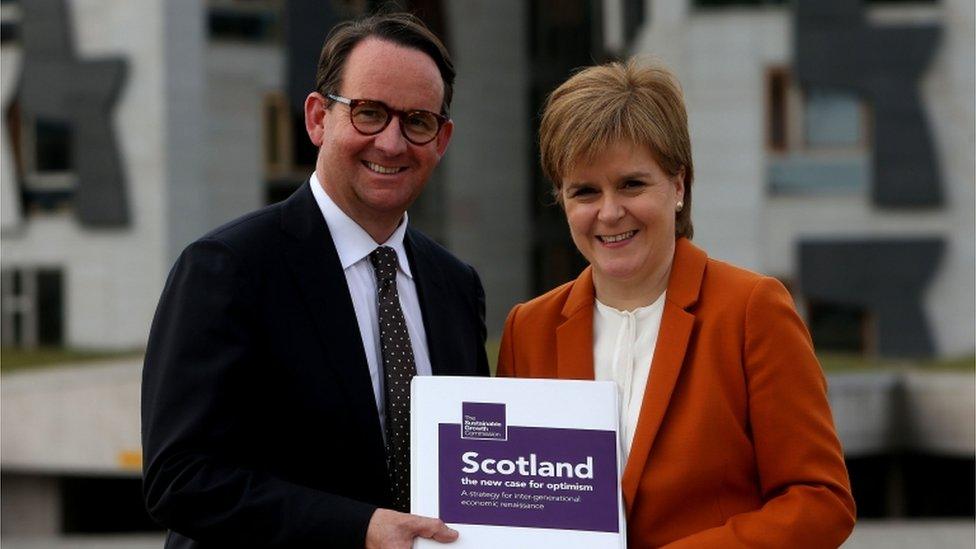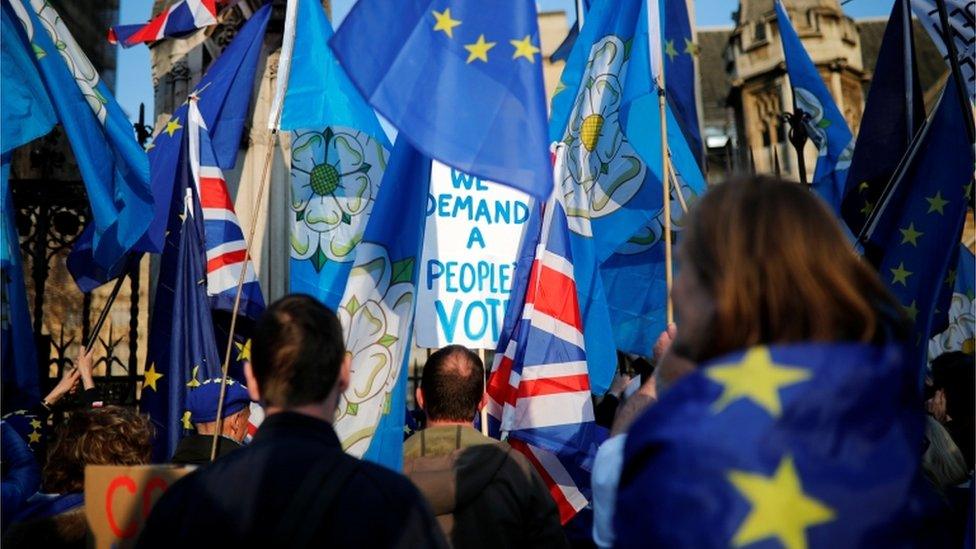Brexit's effect on the case for independence
- Published
The SNP conference will this month debate how to update the economic case for independence, forcing the party to make some difficult choices.
It does so against the backdrop of Brexit, which has taught many lessons on how not to go about constitutional change.
And the man who led a review of the economic case says the Brexit experience means people demand honesty, detail and truth-telling.
One question that the Brexit saga throws up is whether a referendum is any way to decide a deeply divisive issue.

Honesty, truth-telling, detail and difficult issues being addressed: Andrew Wilson, guru of the SNP's rebooted economic case for independence, intends to contrast the road to Scottish independence with the Brexit saga.
That sorry tale of constitutional malfunction, and a slogan on a bus, is far from finished. We're stuck somewhere around the end of the beginning.
But it has already given voters a richly-veined mine of lessons in how not to go about constitutional change.
So for those who want a lot more such change, there's a need to learn those lessons, and to be seen to be a long way from what has happened with the departure from the European Union.
That is Andrew Wilson's take. Since its report was published, he hasn't said much in public about the Sustainable Growth Commission, a 14-member panel of pro-independence folk - from politics, unions, academe and business - which he chaired.
'Journey to yes'
That has changed in an interview he did, with me, for Good Morning Scotland, broadcast on Sunday. He was speaking up ahead of a crunch vote at the SNP conference.
Wilson, a former SNP MSP, is not saying if there was a deficit of honesty and truth-telling in the white paper in 2014. The argument is already tense enough, he is eager to avoid negative messages about others, and the faithful are still hankering after the feelgood factor of 2014.
That was a document for then, and he says there are fresh arguments for now.

Sceptics might point out that independence is not a project for which the rationale changes radically in less than five years. It's for keeps.
But then, if the arguments didn't get independence past 50% back then, it may be unwise to keep plugging them. Better, says Wilson, to find the arguments that could persuade enough people to make the journey from the status quo to 'yes'.
Trade-offs
That voter journey is hugely helped by the status quo having disappeared. Brexit has undercut the argument that being in Britain provides political or economic stability or, of course, a secure place within Europe.
But one of the lessons of Brexit is that bold assertions of what might be achieved, eventually, either through "taking back control" or saying "yes" with lots of enthusiasm, are worth little when set against the complexity of transition.
And for that reason, Andrew Wilson is clear that it is transition that needs much more attention from the SNP. He reckons increasing numbers will accept the case for Scotland to make a success of independence in the long term. It's the short term where they need explanation, reassurance and, yes, honesty, detail and difficult issues addressed.

That requires choices, and few of them are easy. There are trade-offs.
The Growth Commission sought to illustrate the choices ahead by illustrating a scenario for the short to medium term, which would take Scotland through deficit reduction, setting up the institutions of a central bank and making a shift to a Scottish currency that doesn't harm jobs and the wider economy.
This is the path of reassurance to the 10 to 15% of persuadable voters, according to Wilson.
Saltire blueprint
The deficit reduction programme is the item in the weighty Commission report that got most attention from the SNP's opponents. Labour reckons it looks like another decade of austerity, only worse than the last one.
Wilson says that can be avoided if the Scottish economy can be grown faster. The problem is that the way to grow it faster is through improved productivity. That is a long-term project. Short term, the answer is seen as turning on the immigration taps, and measures to draw more people into the workforce.
But in Andrew Wilson's interview, what he made clear is that his report is not the Saltire-shaped blueprint for the future of the Scottish economy, however much it might have been seen that way.

The controversial short term measures are about transition and the platform on which to build stability, he says. From there, decisions can then be made about the kind of Scotland voters want - the level and balance of taxation, for instance, the extent of spending and the scale of welfare support, and how big the state should be.
As we're already learning with the increased income tax powers at Holyrood, these decisions are not made in a vacuum. They invite "behavioural effects", where taxpayers re-arrange their financial affairs to minimise tax bills, so they can be profoundly affected by taxation decisions made in other countries.
These are the next raft of questions, over which parties can compete for control of a newly-independent Scottish Parliament.
Mob mentality
To shape them, yet more commissions are envisaged: on productivity, infrastructure, equal pay, and more committees to look into innovation, university commercialisation, inward investment, and so on. On some of these fronts, such as university spin-outs, there's already activity.
A final thought about lessons from Brexit. To listen to the debate at Westminster, those who once thought a referendum would resolve the European question have learned quite a lot - not only that it can do the precise opposite if the result is close, but that it unleashes a mob mentality which seems to have politicians from Labour and Conservative genuinely scared.
With the exception of the so-called People's Vote on Europe, it is close to impossible to imagine any major and deeply divisive issue at Westminster being resolved through a future referendum.
So where does that leave the referendum as the SNP's chosen route to independence? Some had their doubts when it became official party policy less than 20 years ago. Now, they have to contend with the SNP currently campaigning for a second, confirmatory vote on Brexit.
It's not a helpful precedent for those who want to see such a transition kept simple.